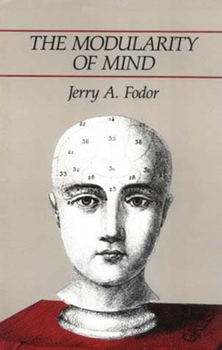The Modularity of Mind
Select Format
Select Condition 
Book Overview
This study synthesizes current information from the various fields of cognitive science in support of a new and exciting theory of mind. Most psychologists study horizontal processes like memory and information flow; Fodor postulates a vertical and modular psychological organization underlying biologically coherent behaviors. This view of mental architecture is consistent with the historical tradition of faculty psychology while integrating a computational approach to mental processes. One of the most notable aspects of Fodor's work is that it articulates features not only of speculative cognitive architectures but also of current research in artificial intelligence.
Format:Paperback
Language:English
ISBN:0262560259
ISBN13:9780262560252
Release Date:April 1983
Publisher:Bradford Book
Length:158 Pages
Weight:0.50 lbs.
Dimensions:0.4" x 5.2" x 7.9"
Age Range:18 years and up
Grade Range:Postsecondary and higher
Customer Reviews
3 ratings
The Stars down to Earth
Published by Thriftbooks.com User , 22 years ago
Fodor usually writes the most arcane books in the cog sci set. The Language of Thought was so opaque that even Hilary Putnam couldn't understand it (circa Language and Learning by Piatelli-Palmarini, ed). This book is written in such a way that even lunkheads such as myself can get it. What he's saying in Psychosemantics I don't know either. But it's nice that he's written one popular philosophy book. When you take this book, together with Stephen Wolfram, you probably get the Language of Thought. When you add Richard Dawkins you get Steven Pinker. Not a bad piece of work.
A CLASSIC WORK OF SCHOLARSHIP
Published by Thriftbooks.com User , 25 years ago
Fodor's short book made "faculty psychology" respectable again and has generated a large literature in psychology, philosophy, and linguistics. Fodor offers brilliant arguments that the mind has special-purpose perceptual and linguistic modules. A central thesis of Fodor's book is that these modules are "informationally encapsulated" -- that is, the modules do their work without being able to access the beliefs that the person has. Thus in an important sense perception is theory-neutral, because what you believe will not affect what you see, hear, etc. For a contrasting view, read chapter two of Paul Churchland's Scientific Realism and the Plasticity of Perception. By the way, Fodor's book is brilliant, but don't look for the entertainingly malicious flashes of humor that typify many of his essays.
Locus classicus in philosophy of psychology
Published by Thriftbooks.com User , 25 years ago
This book really set the agenda in thinking about cognitive architecture for many approaches in thinking about the mind during the late 80s and 90s. In some ways, it is philosophical synthesis of concrete gains from research science in linguistics and cognitive psychology. But it also articulates the path down which much recent thinking has gone. The issue of modularity is getting hot now, especially with the business about evolutionary psychology. This and Fodor's _Psychosemantics_ are *the* texts of recent theoretical cognitive science (if you ask me). Oh, and it doesn't have too many obscurely humorous bits designed to confuse you, as some other of his books do.





